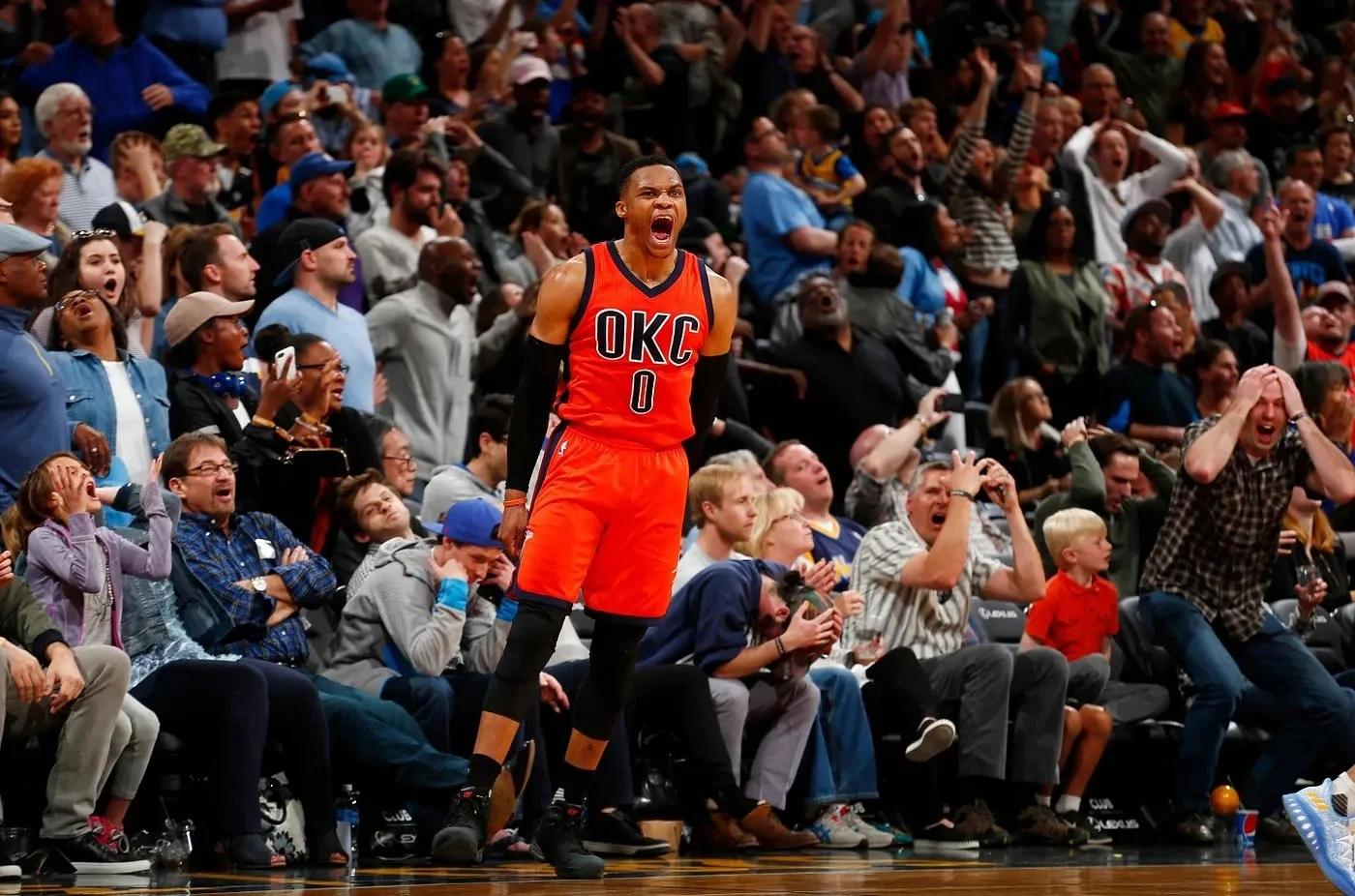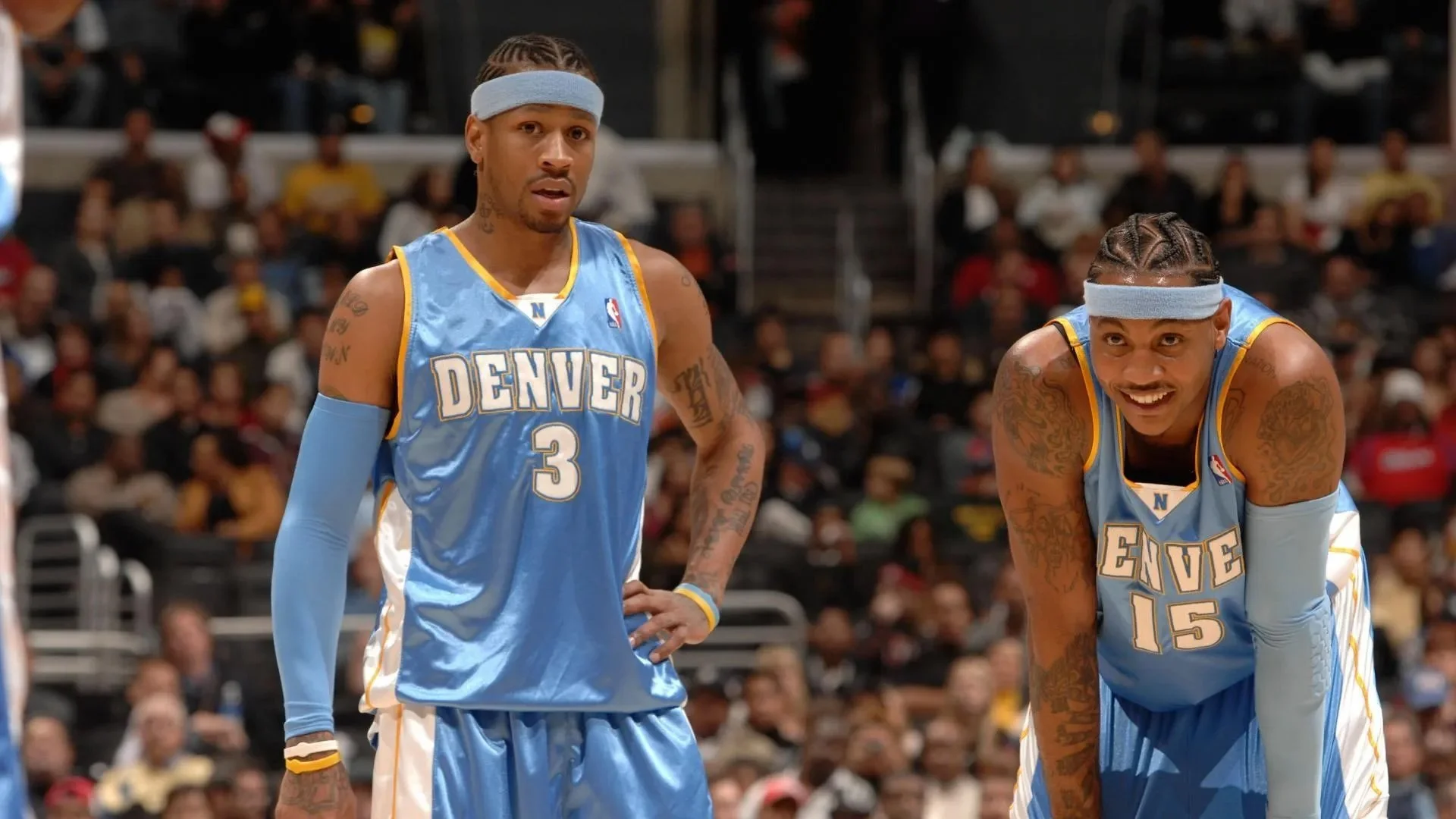We Were All Cheering for Russell Westbrook
But eventually, the applause stops.
I witnessed something otherworldly. At least that’s the way it felt the night Russell Westbrook broke the NBA record for most triple-doubles in a season against, and I affectionately say, my Nuggets.
My love affair with the Denver Nuggets started in 2003 when they switched to the powder blue and gold jerseys with the introduction of Carmelo Anthony (still to this day, those are my favorite NBA uniforms).
I fell deeper in love a few years later with trades that brought Allen Iverson, my all-time favorite player, and J.R. Smith, who would come to encapsulate everything I love about basketball, to the Nuggets.
By the time I moved to Colorado Springs for my first post-grad job a decade later, only an hour drive south from Denver, the Nuggets looked unrecognizable from those early days — not yet realizing their newly drafted rookie Nikola Jokić would go on to be crowned league MVP five years later and back at the top of the MVP race the following season.
A new Colorado resident, I finally got to step foot in the Pepsi Center (now Ball Arena) for the first time. Skylar and I went in on a Nuggets ticket deal together, which got us randomly selected seats for some of the best matchups during the second half of the 2016–17 season.
Closing out that crop of games, we’d get to see Russell Westbrook and his Oklahoma City Thunder attempt to spoil the Nuggets’ chances at clinching the eighth and final spot in the Western Conference playoffs.
Skylar and I downed some Raising Cane’s Box combos (extra toast instead of slaw, extra Cane’s sauce, and a large sweet tea with extra ice) on our way to the game, not fully realizing we were about to witness history.
As a fan of the opposing team, there’s something bizarre that happens when a player your team is facing catches fire and can’t seem to miss. You don’t want them to. Regardless of the score, and how much is on the line, there’s a part of you that wants to see how far that player can take it.
And on that mile-high evening in early April, with the Nuggets leading the game most of the way, one of the commentators said it perfectly as those of us in the stands began to lean in after Russell Westbrook maneuvered around Jokić to get a layup, moving closer to his third 50-point triple-double of the season:
“This crowd understands that something’s going on here.”
When Westbrook found Semaj Christon in the fourth quarter for his 10th assist, finally eclipsing Oscar Robertson’s record for most triple-doubles in a season, we all stood to our feet, regardless of who we were rooting for, and celebrated Russ’ historic milestone.
And then with 2.9 seconds left in the game, in a moment that happened so fast we couldn’t help but stand stunned and try to process what we just saw, the Nuggets up 105–103 and their chances at a spot in the playoffs still intact, Russell Westbrook pulled up a few feet from the three-point line, following the inbound pass, and sank a jumper nearly as deep as the dagger dug into the hopes and dreams of Nuggets fans everywhere.
And still we applauded.
Everyone applauded.
That night, we saw Russell Westbrook pull off something we may never get to experience in basketball history ever again.
Fast forward to now. We’re nearly a month out from the start of the 2022 NBA playoffs, and Russell Westbrook is a Los Angeles Laker along with LeBron James, Carmelo Anthony, Anthony Davis, and Dwight Howard—that sentence would’ve sent a chill down my spine 10 years ago.
Except the applause has shifted to laughter as the Lakers are at risk of not even making the play-in game for the Western Conference playoffs and Russell Westbrook, now in his 13th NBA season, is the butt of various running jokes about his inability to get the ball in the hoop—most notably the “Westbrick” nickname Russ recently denounced in a post-game interview after a loss to the San Antonio Spurs.
As someone who was at the Pepsi Center the night Russell Westbrook scored the Thunders’ final 15 points, including that lethal game-winner to keep the Nuggets out of the playoffs, it’s admittedly jarring to see Westbrook’s public perception take this far of a left. It makes me think particularly about Black athletes and the way they’re scrutinized when it seems they can no longer achieve the athletic feats we once looked at as supernatural.
The list is long. Serena Williams. Cam Newton. Simone Biles. Carmelo Anthony. And that’s just in the past few years.
Russell Westbrook, with his hardly concealable passion for the game and confidence in himself, has been no stranger to heckling and criticism—some fair, a lot more unfair and often racist in nature—throughout his career.
While writing this, I was shook when I realized three years ago today, I wrote a series of tweets about a Utah Jazz fan making racist comments towards Westbrook during a game:
As someone who has experienced the brunt of being a Black athlete in the United States, and who has still dared to be outspoken in both words and dress, Russell Westbrook, in his post-game interview after the Lakers’ loss to the Spurs, spoke up in response to his wife’s reply tweets to Skip Bayless calling Russ “Westbrick”:
“I a hundred percent stand behind my wife and how she’s feeling, because it’s not just about this year. Right now, she’s reached a point, and my family has reached a point, to where it’s really weighing on them. And it’s very unfortunate just for me personally because it’s just a game. This is just a game. This is not end-all, be-all. And when it comes to basketball I don’t mind the criticism of missing and making shots. But the moment it becomes where my name is getting shamed, it becomes an issue…
I don’t even want to bring my kids to the game, because I don’t want them to hear people calling their dad nicknames and other names for no reason because he’s playing the game that he loves. And it’s gotten so bad where my family don’t even want to come to home games, to any games because of not just the media across the globe using platforms to constantly shame, shame, shame me. And it’s just super unfortunate, man. And it’s super upsetting to me, and I’m at a point to where I’m going to continue to address it. It’s just unfortunate.”
I think back to Allen Iverson’s 2002 interview after his Philadelphia 76ers lost to the Boston Celtics in the first round of the 2002 NBA playoffs—now known as the famed “practice” rant. But one of the lesser known parts of Iverson’s interview comes at the end when he opens up about media speculation’s impact on him and his family:
“I am selfish to the fact that my daughter has to go through it. My daughter is seven years old. Ask yourself, if your daughter had to listen to people talk bad about their daddy or mother all the time, how would you feel, honestly? If you have kids, I know y’all understand. This is what my daughter goes through at school. She comes home and says her teacher said daddy don’t leave. Daddy, the girl in my class says you’re getting traded. All for a game, a fucking game.
A lot of y’all can’t put your feet in my shoes because you can’t handle it. But just try to stick your feet in my shoes. It does not have to be a damn day, just try for a minute and try to deal with what I do in my life. My best friend is dead and we lost. And this is what I have to go through for the rest of the summer until the season is all over again. This is what I got to go through…this is my life in a nutshell. Now y’all come home and live your lovely life, live it up and live your life to the fullest.”
For Black athletes, although Westbrook may say, “It’s just a game,” it’s never just about sports. The criticism they receive doesn’t just stay within the arena; it defines their characters and ultimately comes home with them. LeBron, who just dropped 50 points last night at 37 years old, still had “nigger” spray-painted on the gate leading up to his Los Angeles home back in 2017.
Both Westbrook and Iverson speak to the impact the basketball-industrial complex has had on their families. In response to his home being vandalized with the word “nigger,” LeBron James told the media before Game 1 of the 2017 NBA Finals, “My family is safe. At the end of the day, they’re safe and that’s the most important.”
James went on to say, “But it just goes to show that racism will always be a part of the world, a part of America. And hate in America, especially for African-Americans, is living every day.”
I’ve heard before, “Sports is a microcosm of society,” and truthfully I pushed back against this cliché at first because I resisted subscribing to a competitive society defined by wins and losses, where resilience is more of a virtue than pleasure. But it’s true—sports embody the oppressive systems of imperialism, white supremacy, capitalism, and patriarchy that make up our society.
Within these systems, Black, brown, and other oppressed peoples are disposable. So it’s hardly a surprise that sports institutions build up Black athletes that benefit their bottom line only to break them down when their skills begin to decline and burgeoning critiques work in the institution’s favor, funneling more eyeballs towards their events and content.
And still basketball is a game, even if more. And while moments in this game can feel like everything, like that night Russell Westbrook earned the applause of everyone in the Pepsi Center, there are times when the story is simply Russell Westbrook is playing bad—and that’s okay.
The night Russell Westbrook broke the NBA record for most triple-doubles in a season against my Nuggets, he wasn’t worried about me. He didn’t care who I was rooting for. Because he knew the fans that boo can just as easily cheer until the pendulum swings back the other way.
That’s the way this game is played.

